During the COVID-19 era, UNC Asheville’s new Student Health Ambassador Program is using proactive and peer-to-peer reinforcement to instill a strong culture of wellness on campus.
By Mary Claire McCarthy
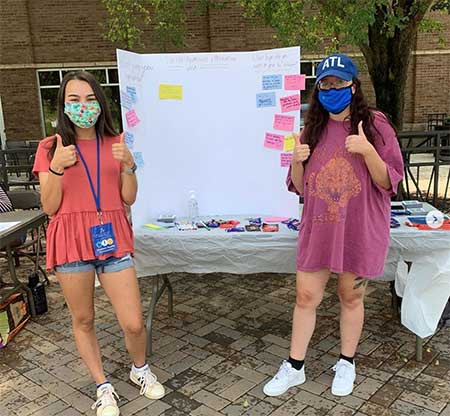
UNC Asheville has only 19 cumulative COVID-19 cases among students and university employees as of Oct. 6. Three students are currently in isolation and quarantine, which makes up only 3% of the 92 spaces reserved for on-campus student quarantine or isolation.
There are multiple reasons why UNC Asheville has fared so well. One is the new Student Health Ambassador program funded by a $610,000 COVID-prevention grant from the N.C. Policy Collaboratory at UNC-Chapel Hill. This grant is part of $29 million the Collaboratory recently received under the coronavirus relief package to study treatment, community testing and prevention, and the public health and economic impacts of COVID-19. Roughly one-third of the grant money supports the Student Health Ambassador program, while the rest supports two other COVID-related projects and an evaluation of the projects.
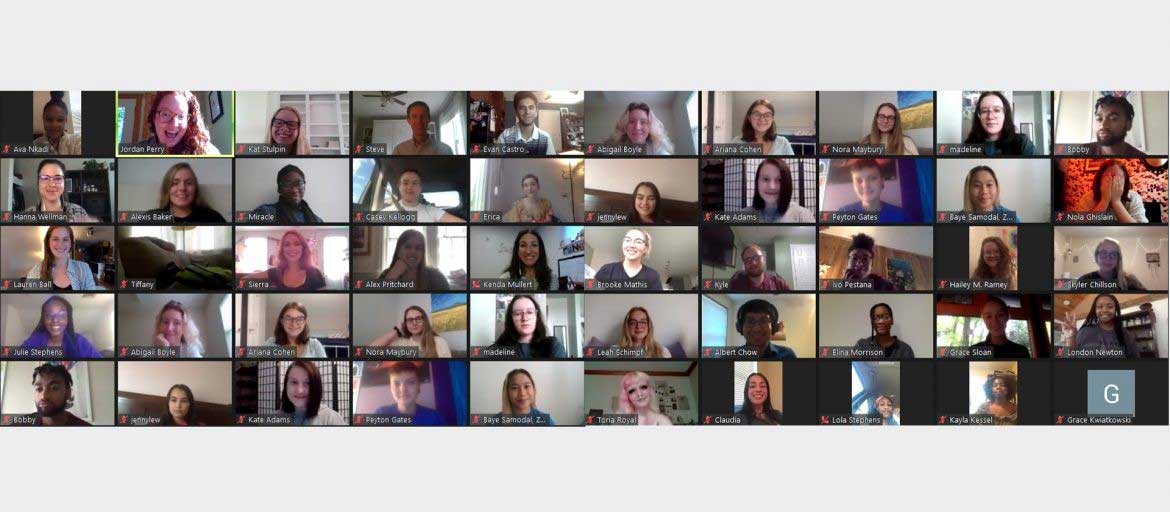
The N.C. Center for Health and Wellness (NCCHW) at UNC Asheville leads the project’s research and evaluation components while collaborating with UNC Asheville faculty from the University’s Applied Social Science program and the Mountain Area Health Education Center (MAHEC). The project also has added support from other members of the UNC Asheville faculty and staff, affiliates of the university and undergraduate researchers from health and wellness, sociology, political science, economics and statistics sectors of UNC Asheville.
Jordan Perry, UNC Asheville’s Healthy Campus Liaison, offers a rationale for why the University has so few cases. Perry says, “We have a pretty small community here, so folks feel a sense of responsibility to each other in a way that might be missing at larger campuses. We don’t really have a big party culture on campus either. Students certainly socialize and have fun, but students don’t come to UNCA to party.” Perry says another significant factor was the work of Residential Education to offer lower density housing on campus.
The Student Health Ambassador Program employs 45 Student Health Ambassadors who provide peer-to-peer support with a goal of changing campus culture and abiding by community health standards. These public health measures are practices we’re all familiar with, like wearing masks, washing hands and keeping a safe six feet apart.
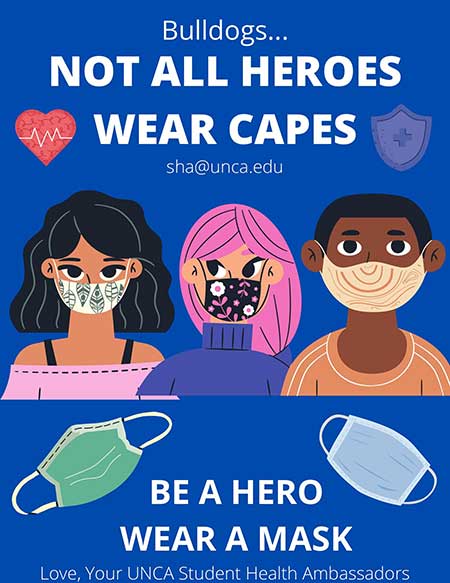
Dr. Lanou explains the decision to intentionally avoid putting the Student Health Ambassadors in an enforcement role. Peer education experience and higher education experts agree that shame and fear tactics aren’t an effective strategy for students or really anyone for that matter. Some experts suggest that punishing and scolding students for not following guidelines can even mean they’ll be less likely to cooperate with testing or contact tracing efforts later on.
Instead, Student Health Ambassadors have the best chance of success working positively, proactively, and preventively. The ambassadors are your classmate, your friend—and we all know we’re more likely to listen to advice from a friend than a stranger. Especially a stranger that reprimands you and only tells you what you can’t do.
Alexis Baker, an accounting major and Student Health Ambassador explains that most of the information they share with fellow classmates is just a reiteration of what professors and the administration have said through emails but “having an answer come from a peer seems to resonate better with students.”
Student Health Ambassadors don’t just role-model mask-wearing and social distancing policies; they also connect with students by answering questions and proactively providing resources to keep the community safe and healthy. The ambassadors work in specialized teams across eight areas, ranging from communication to wellness coaching, with each group supported by a faculty or staff member as an advisor. These students completed ten hours of initial training provided by UNC Asheville staff and partners at MAHEC and now lead COVID-19 prevention education, provide health communication and offer social support to isolated or quarantined students.
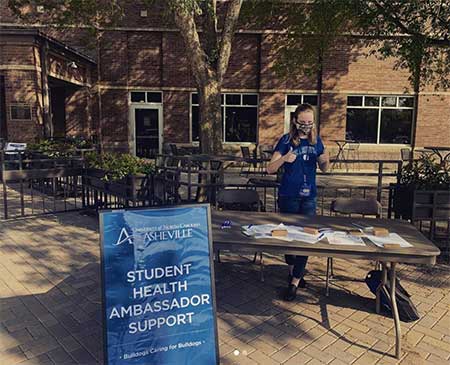
Faculty can schedule class visits and presentations from the ambassadors, and individuals can request wellness coaching sessions. One can find the Student Health Ambassadors at eight Support Stations across campus or through virtual office hours.
“The ambassadors have been really smart about thinking about how do we move beyond making sure people wear masks and wash their hands,” Dr. Lanou says, “to how do we help each other stay and feel supported under these extraordinary circumstances.”
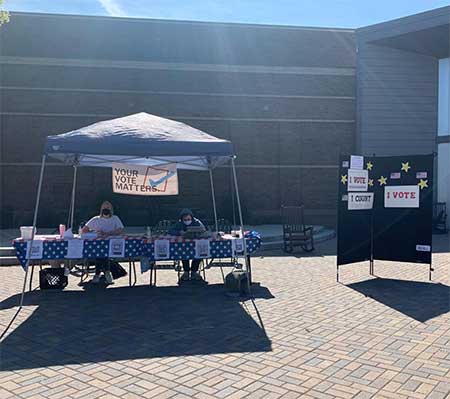
Baker speaks to this issue, saying, “One common thing amongst all students right now is feeling lonely and anxious about the unknown.” Baker is on the athletics-focused team. This team is making mental health resources available for students, and creating an event that, get this, isn’t happening over Zoom. Instead, the upcoming field day event will bring students and student-athletes together to enjoy some games, sunshine and the campus community. The day will feature some classics like the egg-on-a-spoon race and corn hole—all while abiding by social distancing and sanitation protocols.
This ambassador program extends past UNC Asheville’s campus to five other higher education institutions in Western North Carolina. UNC Asheville staff spent the summer developing, recruiting, hiring, and training for this program and then supported training for five other regional campuses. These include Brevard College, Mars Hill University, Montreat College, Warren Wilson College and Western Carolina University. Taken together, the program shares knowledge with 22,000 combined students, faculty and staff. The program isn’t cookie-cutter either. Each college or university takes UNC Asheville’s framework and adds its own local expertise to create a plan that best fits its campus.
The Collaboratory grant provides funding for the Student Health Ambassador program at UNC Asheville, while UNC Asheville has found other funding opportunities for the partnerships at the other campuses.
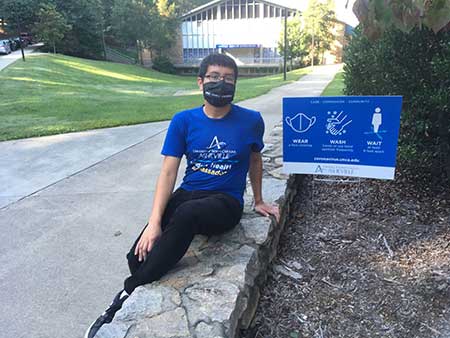
“As we interviewed and hired students, we looked for those who were committed to taking care of themselves and their campus community,” says Perry, who led the hiring process with Kenda Mullert from the University’s Student Health and Counseling. Students at UNC Asheville want to help their community and fellow classmates. Not to mention, students don’t want to have to pack their bags and go home. The program received 112 applications in just nine days. People of color were prioritized in the application process because research shows that this pandemic is hitting minorities the hardest.
The University still faces challenges. “I’d say some people have adopted an either-or mindset with social distancing or mask-wearing,” Perry explains that while the commitment to mask wearing has been impressive, she’s seen some students keeping six feet apart without masks or standing closer together with masks. She also worries students, faculty, and staff may become less vigilant about safety measures as the semester continues. Overall, she has been impressed by the campus community’s commitment to keeping each other safe.
While Student Health Ambassadors create strategies to shift campus culture down a safer path, two other COVID-related studies are also underway at UNC Asheville. Roughly two-thirds of the N.C. Policy Collaboratory grant supports a social-bridging program to ease the isolation of older adults and a state-wide COVID-19 comorbidity study.
These studies will help more than just the University but also the surrounding mountain region. For instance, across the six western North Carolinian universities, the Health Ambassador program reaches hundreds of people who then leave the campus every day. They carry social health knowledge back home and share it with others. Keeping the universities up and running impacts more than just education and social health, but western North Carolina’s economy, as well. Western North Carolina has a much smaller population than central and eastern North Carolina, so aside from tourism, higher education institutions employ a large percentage of the local community. Keeping higher education institutions open supports channels of economic security and individual and communal resilience.
“One thing I think we’re doing that is innovative and unique is that the six western institutions are working together to have this coordinated response,” says Dr. Lanou, “It’s both coordinated and individual. I’m sure that’s an advantage.”
This pandemic has turned our world upside down. But it has also forced us to rise to the occasion and come together to navigate these unprecedented times. As Dr. Lanou says, we’re simply doing our best to build our ship as we sail it.
Mary Claire McCarthy is a second-year graduate student at the University of North Carolina at Chapel Hill Hussman School of Journalism and Media. Upon completion of her thesis research this fall, she will finish the Dual-Degree Environmental Science Communication Program. Her research focuses on how communicators can harness the power of social media to engage with Generation Z on environmental topics such as climate change and forest ecology. If you would like to reach her to discuss this research, her email is mclaire7@live.unc.edu.
